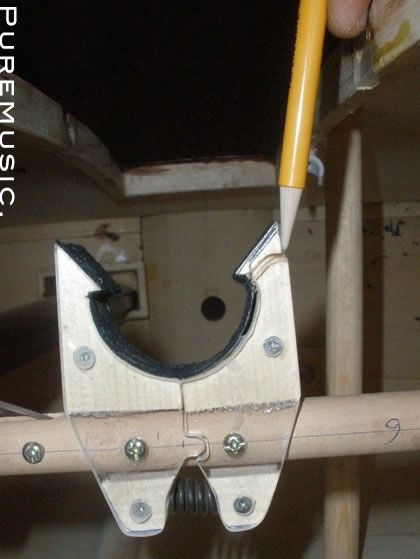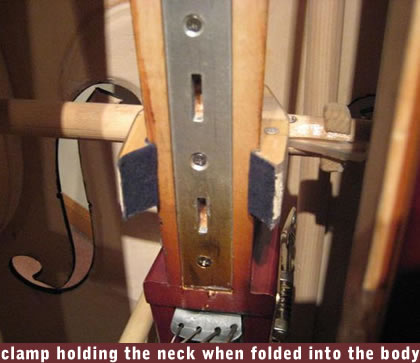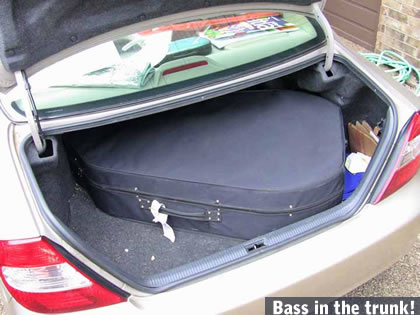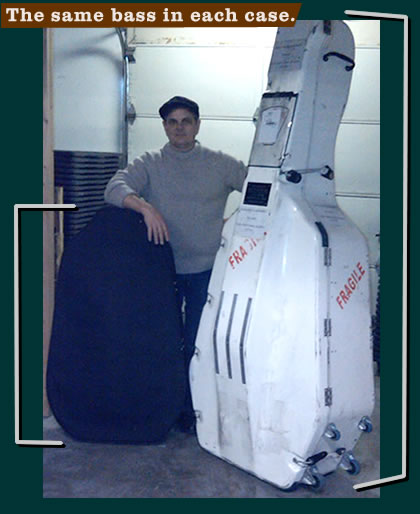
A Conversation with Charlie Chadwick (continued)
CC: When I was in college, I studied mathematics. And in mathematics there's an expression that you use, it's "elegance." "Elegance" describes a type of solution to a problem. An elegant solution is the simplest, easiest, fewest steps, most efficient solution to a problem. As you can image, in math there are many ways to solve an equation. But the elegant solution is the one that makes mathematicians get all excited. "Oh! Oh! How simple, only three steps. Beautiful!"
PM: [laughs]
CC: And for me, the elegance factor is the simplicity. It's misleading, because it is not so simple to come to the solution, but once you see it, you go "Ah!" It just makes you feel good. You go, "Oh, that's so straightforward, it goes right to the point, right to the heart of it."

So it is simple. If you want, I'll show you how to do it. You can do it to your own basses if you want. But good luck.
PM: No, no, no. Nobody in their right mind, present company notwithstanding, is going to do that.
CC: Yeah. Well, if a guy was handy with his hands, and really felt like doing it...
The bass that I'm building on, the platform I'm building from, is the Sam Shen SB-100. Sam Shen retails that bass in the United States for $2,100. That's no strings, the fingerboard isn't shaved, there's no case, there's no bass bag, that's just the bass. Okay? That's the bass that I'm building on, with a few extras. The price of the folding bass is $2999 plus shipping. That includes the hard case, a set of installed strings, and an adjustable bridge.
Because this is my little business, and because my income is my little studio and playing gigs, capitalization is always an issue. The obvious customers are the traveling professionals. They see the value, they've got 3,000 bucks, and they're going to buy one and get me up and running.
But potentially, if this could be a student bass, for instance -- like imagine schools, if schools bought basses, and they say, "Well, we travel, we have a traveling band, and we could put these in the music room without having huge closets to store them in, and a kid could take one home without having to have a station wagon or a van, or we could put it in the bus for our traveling gigs" -- the school market is gigantic.
And another market would be people who live in the city. You lived in New York, you know how it is. You want to be an upright bass player going to gigs in New York? Think about it. Well, this is the solution for a lot of people. It fits in the trunk of a car. I put this in our Camry trunk.
PM: It fits in the Camry trunk?
CC: Yeah.

In New York recently, I just put it in the trunk of the cab, and I had room for other bags and suitcases. We're talking a huge paradigm shift.
PM: Oh, my God.
CC: And then think about electric bass players who say, "I'm losing gigs because I don't have an upright. I'd like to have an upright." They can buy this one for $3,000. 3,000 bucks and you've got an upright that goes everywhere. You can practice it at home, take it on gigs whenever you feel like it. It can be your only bass. And those markets become huge.
But the way I would approach those markets is with me selling it right now, with me being the retailer, I can make enough on each bass that I begin to develop the capitalization I will need to make the business work. You're sticking a lot of money out there because you're buying basses--
PM: Well, somebody is.
CC: Well, it would be me. And I'd have to put these basses out there, and realizing that they will sell. They may sell as far as you put them up on the storeroom floor, I don't know. But it would depend on the number of outlets you're talking about, 20, 30, 50, 100 basses all out there in the world either collecting dust or converting new purchasers. I don't know how--
PM: Okay. Well, here's the smaller idea that goes with your plan that speaks to the other idea. I'm sure you may have considered this already -- but having key guys in all the major cities.
CC: Yes.
PM: They get special pricing, in return for what they do for you.
CC: They show the bass.
PM: Yeah.
CC: I'm with you.
PM: Any time somebody calls you, you say, "Yep, I'm playing with so-an-so tonight. Be there or be square."
CC: Yes. I've got my guy in San Francisco, I got my guy in Boston, I got my guy in Philly, and people can go see the bass, talk to the player who's using it.
PM: You're there already, right.
CC: I like that idea. Another marketing idea that I'm incorporating right now is that the bass -- since you can't touch it and see it and play it before you buy it -- that's always a difficult -- imagine if someone told you, "Yeah, Frank, I got a guitar, send me $3,000 and I'll send it to you."
PM: Sure, that's gonna happen.
CC: Yeah, it's not. So I thought, well, since they can't really see it, they just see a website, I'm selling it to them with full money back return. If you don't like it, just put it back in the package and send it back to me, and I'll refund all of your money except the shipping. That is a very generous trial, but I really feel that gives the player the confidence. He goes, "Okay, if I get all my money back if I don't like it, then the seller is telling me he really believes in this thing."
PM: Yeah.
CC: So that's what I'm doing in the beginning. Since people see it on the website, they see a video, they're going to hear a couple of endorsements, a couple of glowing comments from customers, and they're still going to go, "Damn, I just don't know if this is something that -- am I going to get it and think 'this sucks, I just spent 3,000 bucks for something that's no good?'" But instead, they can try it out, and if in a couple of days they've played it, put it together a couple of times, and if they go, "Nah, it's not for me," just send it back. And I think with all of those things in place I'm going to get people to try it. They try it, they're going to love it.
PM: What is that website, Charlie?
CC: foldingbass.com
PM: Yeah, of course that was available because nobody had figured it out.
CC: If you Google "folding bass," what you get is my website, and then folding bass stand, folding bass chair, folding bass drum stand, but no folding basses. There's no such thing, never was.
PM: Not until now, people.
CC: My thinking about it is, it's a trust issue. Do they believe it? Because bass players, we're skeptical. We've seen the solutions come out, and none of them really do it.
PM: And why wouldn't they be skeptical at this point?
CC: Exactly. The other solutions just don't work. But I've sold five of these right now, and that's sight unseen. They just heard about it, and they went, "Okay, let me try it out." Well, none have come back. And those are people that sent $3,000 to me and said, "Okay, well, send me a bass." That's how much confidence they had or how desperate they are, I'm not sure which.
PM: I'll tell you what, Charlie, I was associated with Mesa Boogie in the days when people had to send thousands of dollars up front and wait six months to get an amplifier. And in time that grew into the very respectable cottage industry you know it as today.
CC: Yeah, yeah. It's possible. And boutique builders, you expect to wait for an instrument. I just don't want to put the major word out there and then not have them available. That, to me, is not good business. And once again, my efficiency side comes out. I think having to wait, that's bullshit. If I'm going to say this is available, I need to say, "Okay, where is your address? I'll send you one." That's how I want to do business. So I'm trying to time the interest in the instrument with the availability, trying to match those two up. The problem is always there's so much guess work involved. The easy thing to do would be not to sell any and let 50 of them come over and then start selling them. But the problem with that is that I have to buy 50 of them.
PM: Yeah, right, you've got to be capitalizing today.
CC: But I did have an interesting email conversation with a fellow over at the publishers of the International Musician. I've been a member of the Musicians Union for 40 years, and they have a journal, it comes out every month, it's mailed to every professional musician in the union in the U.S. and Canada. And they just started a few months ago a feature called Cool Tools. And Cool Tools would include music stands or saxophone cases -- anything they thought was a kind of interesting new product out there. And I saw a couple of things in there, and I thought my bass would be great in this because this really is something new. So I took a chance and I called them and talked to the staff writer editor over there. And he goes, "Hey, that's great. I was just thinking the other day I don't have enough stuff on basses in my Cool Tools section. This'll be great." I mean, that could launch it in a huge way, all of a sudden it's in the home of every professional musician in the country.
PM: Well, what's going on with the people at Bass Player magazine? You have a friend over there?
CC: Dave Pomeroy is a good friend of mine, and he's been writing articles for them for years. And Dave told me, "When you're ready, I'll walk you in there, and we'll show it to them, and we'll see if we can get a feature article on it, we'll go for a cover story, whatever we can do, I'll get you going."
PM: Wow! Oh, imagine getting a cover story in Bass Player, how exciting that would be!
CC: Well, I haven't gone to Dave. Dave just won the presidency of our local union.
PM: He did?
CC: I didn't know if you'd heard that. Harold Bradley is out. Dave Pomeroy is our new pres.
PM: Oh, my God!
CC: It was a huge upset. And I voted for Dave.
PM: Holy jeez, that's incredible.
CC: Yes, Dave is my man. And Dave is the new president. And it all kind of happened right at the time when my basses were starting to arrive. I just don't want to overwhelm Dave with things. But it's on my docket to call him next week and say, "Dave, I'd like to bring the bass down to your office, down to the union and show it to you, and see what you think. And let's see what you're willing to do and what you want to do to get this thing going." So I'm going to give him the first shot. Dave has been enthusiastic about this from day one. And he's a good writer and he has the--
PM: He's a real -- a term I'm going to coin a term for you now -- he's a real amBASSador.
CC: He is an amBASSador, you are so right on. And another good thing that happened is, you probably know Dan Miller? He's the publisher of Flatpicking Guitar Magazine.
PM: Oh, yeah.
CC: He's a great guy and a great guitar player and enthusiast of acoustic music. And he was over to the studio. We just finished producing Flatpicking GuitarMagazine compilation record at my studio with -- Tim May was the producer here locally. And Dan asked about the bass. And I said, "Well, I'm so glad you asked. It's sitting right here." And he went, "That's it?" People can't believe it. So I took it apart right in front of him and put it back together. He goes, "Oh, my God. I want to do an article on this. I want to write the article and put it in flat picking magazine." And he said, "I also can walk you across to Bluegrass Unlimited, which is a sister magazine of ours, and they'd love this thing, too."
PM: Unbelievable.
CC: So it's starting to explode.
PM: Oh, it's happening, Charlie. And it's going to happen.
print (pdf) listen to clips puremusic home


